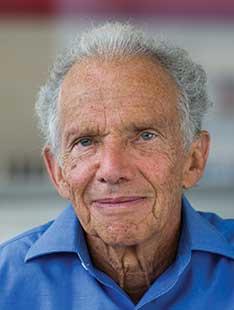Professor Joel Cooper Is Studying Pandemic Cognitive Dissonance
‘There are some who do believe in vaccines, but they just haven’t gotten themselves there yet,’ Cooper says
When the pandemic hit and his lab was shut down, psychology professor Joel Cooper had a moment of inspiration. He and graduate student Logan Pearce were talking on a Zoom call when they realized they might be able to use their research to address some of the issues raised by the pandemic, such as the reluctance by some to wear masks, socially distance, and get vaccinated. Done right, that kind of research might actually give policymakers better tools. “It was definitely an ‘aha!’ moment,” he recalls.
Cooper studies how we can be nudged into making better decisions when confronted with differences between what we believe and what we actually do — for example, when we agree that exercise is important, but don’t actually exercise. These common examples of inconsistent thoughts or beliefs, known as cognitive dissonance, can be a potent force for good.
For their study, Cooper and Pearce found 101 people aged 18-67, in 18 different countries, to participate. One group was encouraged to advocate for a public-health position — such as “It is important to wear masks” — and then tasked with recalling situations when they were out in public and didn’t wear a mask. Other groups were told just to remember the times they failed at meeting the recommendation, or just to advocate for the public-health position, or to do no tasks at all.
The researchers followed up a week after the initial survey and assessed the behaviors of the participants. People in the first group, who had done the cognitive-dissonance work, were much more likely during the next week to have complied with masking and social-distancing recommendations and to have sought vaccination appointments than the control groups that didn’t do the cognitive-dissonance exercise.

The combination of advocating for a position and realizing that your actions don’t always align with it can be powerful, says Cooper. “The way to reduce [cognitive] dissonance is to change your actions, even a little bit, to make them more in line with your beliefs,” he says.
Cooper says the findings could be applied more widely; for example, a state might hold a contest where people have to write an essay or make a poster about COVID-19 public-health recommendations that also addresses times when they haven’t acted in a way that syncs up with those recommendations. Publicizing an example of someone else’s cognitive dissonance could help the community, Cooper says. “There are some who do believe in vaccines, but they just haven’t gotten themselves there yet — it’s just a little difficult for them,” he says. “We need to move the needle a little at a time.”
Cooper would like to continue working on psychological techniques to address problems related to the pandemic and to apply his years of cognitive-dissonance research to public health. He says his research has changed through this experience. “I’ve been doing research and teaching about cognitive dissonance for decades,” he says. “For the most part, I have been more interested in advancing the theory than assessing its practical application. But I feel that I have gotten to a place where we are able to use what we’ve learned to make some positive changes, and it is really fantastic.”












No responses yet